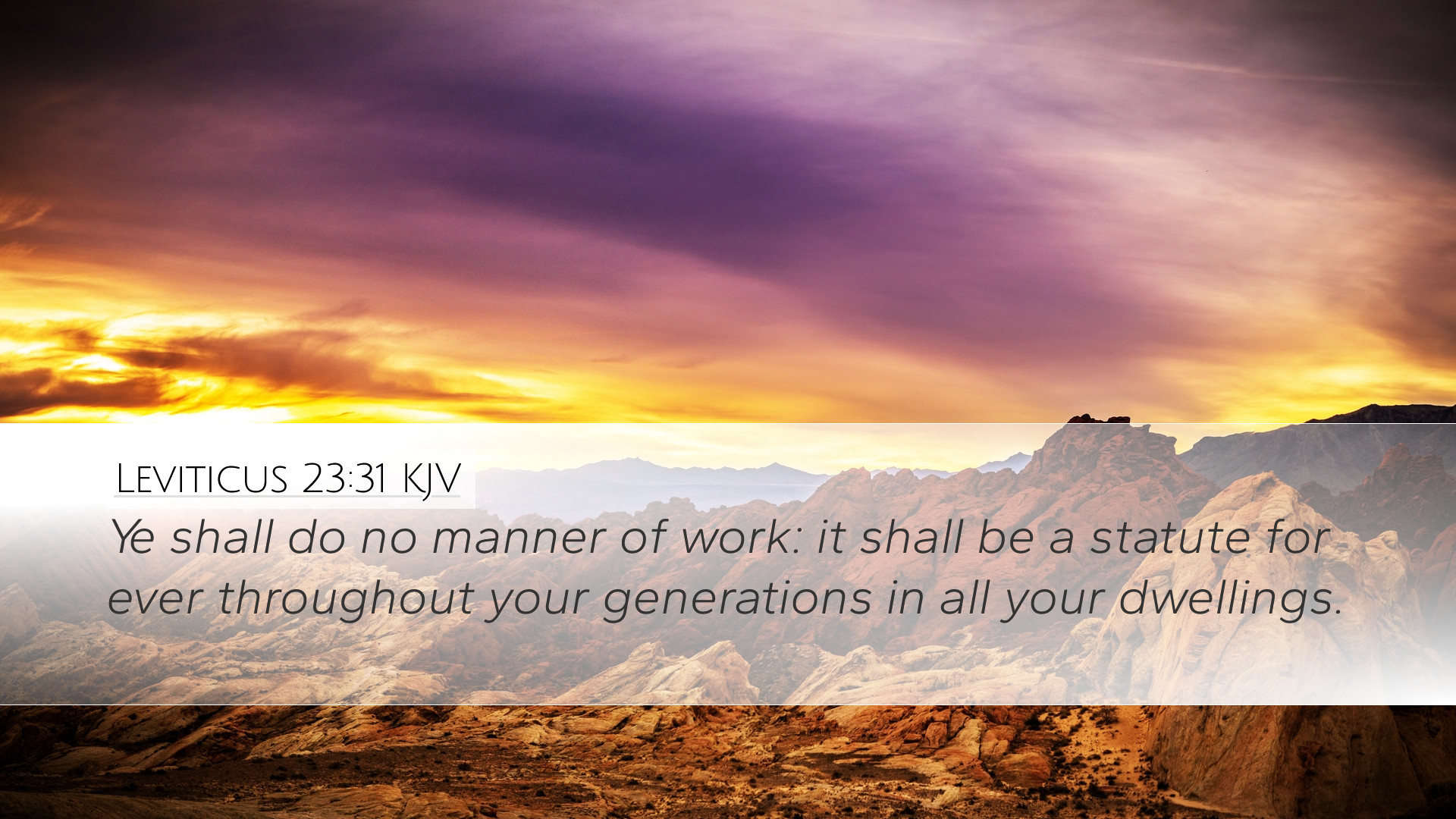Commentary on Leviticus 23:31
Verse: "You shall not do any work. It is a statute forever throughout your generations in all your dwellings."
Introduction to the Passage
This verse is part of the overarching theme in Leviticus chapter 23, which outlines the feasts of the Lord and their significance to Israelite worship. Here, we explore the implications of the directive issued to the Israelites concerning the observance of these sacred times.
Contextual Analysis
The context of Leviticus 23 is pivotal, as it enumerates the appointed times that God commanded Israel to observe. Each feast holds a distinct place in the religious calendar of Israel and symbolizes various aspects of their covenant relationship with God.
Significance of the Sabbath Rest
Matthew Henry comments on the ongoing nature of this rest, emphasizing that it reflects God's holiness and the restorative purpose of rest in human life. The prohibition against work emphasizes reliance on God's provision and the necessity of regular intervals of worship and reflection.
Albert Barnes observes that the command is not merely for ritual observance but serves to instill a profound respect for the Lord's design in creation, where rest is allocated a divine role. This geodetic rhythm allows individuals to reconnect spiritually and physically.
God's Sovereignty and Human Responsibility
The directive underscores the balancing act between God's sovereignty and human responsibility. By instituting a day devoid of ordinary labor, God reinforces the idea that while human work is necessary, the ultimate control over time and outcomes resides with Him.
Adam Clarke elaborates that this statute offers profound insights into the relationship between work and worship, fostering a mindset where one prioritizes communion with God over relentless labor.
Eternal Statute
The phrase "a statute forever throughout your generations" suggests a lasting principle, indicating that these observances transcend mere ritual. There is an evolving application for contemporary believers, illustrating a perpetual call to prioritize divine engagement over secular concerns.
Theological Implications
The command reflects theological pillars such as grace, dependency upon God, and the maintenance of a sanctified rhythm within human life. This passage illustrates that divine commandments are intended for the ultimate well-being of individuals and the community.
Reflection on Personal and Communal Worship
Understanding the depth of this verse can guide grounded practices in both personal devotion and communal worship. Matthew Henry suggests that the practice of resting and commemorating God’s works invites reflection on God’s goodness and faithfulness, promoting deeper communal ties among believers.
Application to Modern Life
For pastors, students, and theologians, the instructions found in this verse may serve as a framework for deeper spiritual disciplines. It calls for the acknowledgment of the sacred versus the secular, challenging modern believers to reassess how they structure their weekly rhythms.
Encouragement for Spiritual Community
- The prioritization of corporate worship reflects an ongoing commitment to God’s design for community life.
- Encouraging disciplines of rest and reflection points to a holistic approach to spiritual growth.
- The theological underpinning fosters an understanding of divine grace operating within established rhythms.
Conclusion
The command in Leviticus 23:31 serves not only as a historical note for the Israelites but also as a foundational principle for all believers. The suspension of work during sacred times reflects a divine invitation to seek God’s presence and acknowledge Him as the source of life and sustenance. As pastors, students, and theologians reflect on this text, they should consider both its ancient context and its ongoing relevance in cultivating a rhythm of rest that glorifies God.


